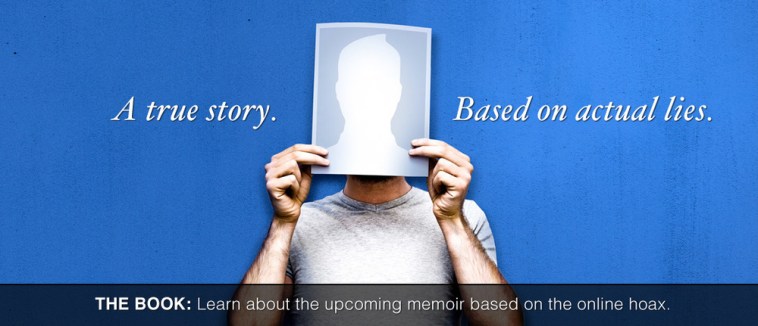I’m quitting my job and walking across America. Maybe the world. And I’m going to post updates, here, on Facebook. Why am I doing this? I’ve been in a rut.
When Dave Cicirelli clicked submit on a Facebook note titled “Important Announcement” he could never have known that an idea that began as a joke at a bar would evolve into a six-month “journey” and, four years later, a book. Enter “Fakebook,” in which Cicirelli spent six months of his life avoiding photos, ignoring old friends and fooling the Facebook community into thinking he had gone on a quest that was more Walden and John Galt than his actual reality.
Videos By Rare
As a graphic designer, Cicirelli made a living enhancing images to appeal to the human visual aesthetic. As a Facebook user, the life he portrayed was not unlike the manipulations he made into images each day. Rather than find the correct light pattern or enhance a photo’s beauty, Dave was manipulating his own life; or how it appeared to hundreds of friends on Facebook.
“I started this thing with very little thought out, it was a seat of your pants thing. It started mostly out of a sense of mischief. The way people reacted to these things that weren’t happening, how personally their reactions were…it made me realize that I had tapped into something richer and deeper than what I expected.”
As Cicirelli’s journey went into full swing, his community of Facebook friends became even more invested. In “Fakebook,” he publishes the comments and concerns from friends and family members. What most did not know was that Cicirelli’s parents and several close friends from home were in on the act the whole time. These “co-conspirators” brought a sense of legitimacy to “Fakebook.” Whether it was Cicirelli’s father repeatedly telling his son he was breaking his mother’s heart and to go to law school, or childhood friend Ted Kaiser offering advice, often curt, about whether Dave should maintain a relationship with his fake Amish girlfriend. As days turned into weeks, Cicirelli’s life became a consolidated act of maintaining daily appearances while keeping the ruse alive.
“There always had to be new things happening. The day-to-day while I was actually at my office, these people became my only friends. The reaction was varied, some people really got what I was doing and other people couldn’t fathom it. There was this layer of fear anytime someone from the office posted something. I had to pay attention to what I call “social-media surveillance.”
The activities of “Fake Dave” soon began to encroach on the social life of “Real Dave.” In one of the more entertaining passages from “Fakebook,” Cicirelli describes the newfound anxiety of courting a woman — someone he knew would look him and his online persona up as soon as she could. Cicirelli turns this bit of drama into a commentary on the accessibility of information and how it can damage first impressions.
“It’s like flipping over a baseball card and [the girl] sees everything about me…in my case she would have seen me having this nasty break up with an Amish girl. It uses these fictional scenarios to create that lens of a very relatable phenomenon to meet someone new and drown in all this information. There is just so much information to overthink. At the end of the day people still relate to each other, we can change the circumstances but people will ultimately find their dance partner, even if the dance is changing.” In Cicirelli’s case, the girl in question found his online antics befuddling but amusing.
As he looks back on his social experiment four years later, Cicirelli is aware that in the ever-evolving landscape of social media, his ruse may not have been possible today.
“I tried to write “Fakebook” as a period piece. This was that moment in time when it was really new to us. This story is absolutely set in 2009 and 2010. As social media proliferated, the same basic instincts are still there, it just splintered a bit.”
If Cicirelli had embarked on his journey today, applications like Twitter, Instagram and Snapchat could have further confounded or corroborated his experiment. Despite this, he still believes Facebook remains “the ultimate tool to stay in touch with someone.”
Deep at the heart of “Fakebook” is Red Bank, N.J., the central New Jersey coastal hamlet where Cicirelli was born and raised. Cicarelli’s relationship with his hometown, and the people within it, form the basis for the type of online relationship he was able to manipulate.
“I felt like I needed to make Red Bank a character. So much of what Facebook does is to keep you connected with your community. What I did with Fakebook was that I completely exiled myself from it. I felt like it was important to emphasize the place that Facebook was forever linking me to, and in turn I was corrupting my relationship with. “
Released from Sourcebooks Inc, “Fakebook” is an honest and often tragic tale of how one man chose to interact with his peers. By altering his online persona, Cicarelli is able to tap into the inherent curiosities and obsessions that come along with engaging with social media. How each person reacts to his plight shines a light on the idea that people choose what they want to believe and, in some cases, need to believe.
Douglas Barclay is an intern for Rare. Follow him on Twitter @douglabarclay17

